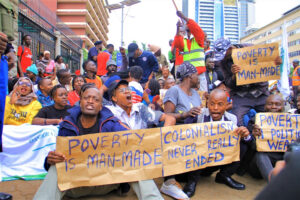Occupy Parliament: Kenyans Protest 2024 Finance Bill
Kenyans will flood Nairobi’s streets on Tuesday to protest the proposed tax hikes in the Finance Bill 2024. Named ‘Occupy Parliament’, these demonstrations aim to pressure lawmakers to reject the bill, which the House will review on the same day.
Rallying Cry Against Over-Taxation
Online, Kenyans have been rallying support for the protests by sharing posters and guidelines. Demonstrators will gather outside the Parliament buildings in the central business district. On Monday, flyers circulated in the CBD, urging citizens to “rise against over-taxation by Zakayo,” referencing President William Ruto and his tax policies since 2022.
Protest Logistics and Guidelines
Activist Boniface Mwangi announced on Monday that the protest would start at 11 a.m., ahead of Parliament’s 2 p.m. session. Posters on social media urge protesters to wear black and follow a code of conduct. This includes staying calm, avoiding violence, refraining from abusive language, and preventing property destruction.
Government’s Response
National Assembly Majority Whip Sylvanus Osoro stated that the Finance Committee is considering amendments to the bill. They may change clauses proposing higher taxes on bread and vegetable oils, a motor vehicle circulation tax, and levies on internet and money transfer services.
The Finance Bill’s Scope
The controversial bill, sponsored by Molo MP Kimani Kuria, seeks to amend several laws. These include the Income Tax Act, the Value Added Tax Act, the Excise Duty Act, the Tax Procedures Act, and the Miscellaneous Fees and Levies Act. Additionally, it targets the Affordable Housing Act, the Industrial Training Act, the Data Protection Act, the Public Finance Management Act, and the Kenya Revenue Authority Act.
Public Participation and Opposition
During the public participation phase, which ended on June 10, over 600 stakeholders presented their views to the Finance Committee chaired by Kuria. The Treasury aims to raise an additional Ksh.300 billion through the proposed taxes, but opinion polls indicate widespread public opposition.
Kenyans United in Protest
Kenyans from various sectors and walks of life have united in their opposition to the Finance Bill 2024. They argue that the proposed taxes will burden ordinary citizens and stifle economic growth. The protests reflect a broader sentiment of dissatisfaction with the government’s fiscal policies.
Historical Context of Protests in Nairobi
Nairobi has a rich history of protests, often sparked by political and economic grievances. The city’s residents have consistently used demonstrations to voice their concerns and demand accountability from their leaders. The ‘Occupy Parliament’ protest continues this tradition of civic activism.
Activists and Lawmakers at Odds
The clash between activists and lawmakers underscores the tension between public demand for fair taxation and the government’s need to raise revenue. While the government insists on the necessity of these taxes, activists argue for more equitable and sustainable fiscal policies.
Impact on the Central Business District
The protests are expected to disrupt business activities and traffic in the CBD. The authorities have deployed police to maintain order and ensure public safety. Despite the disruptions, the protest organizers emphasize the importance of peaceful demonstrations.
Dialogue as a Solution
Observers suggest that dialogue between the protesters and the government could help resolve the impasse. Constructive discussions could lead to revisions in the bill that address public concerns while meeting the government’s revenue needs.
Future Implications for Kenyan Protests
The outcome of the ‘Occupy Parliament’ protest could set a precedent for future demonstrations in Kenya. If successful, it might encourage more citizens to engage in civic activism. Conversely, a crackdown could discourage future protests and deepen public resentment.
Government’s Position on Protests
The government has yet to officially comment on the planned protests. Their response will be critical in shaping public perception and future interactions between the state and its citizens. A balanced approach could mitigate tensions and foster a more inclusive dialogue on fiscal policies.
Conclusion
The ‘Occupy Parliament’ protest represents a significant moment in Kenya’s ongoing debate over taxation and fiscal responsibility. As Kenyans take to the streets, the government faces a crucial test in balancing its revenue needs with the public’s demand for fair taxation. The events in Nairobi will be closely watched and could influence the future of civic activism in the country.





